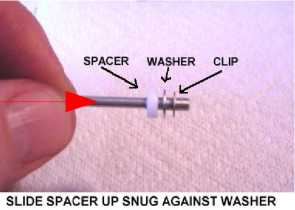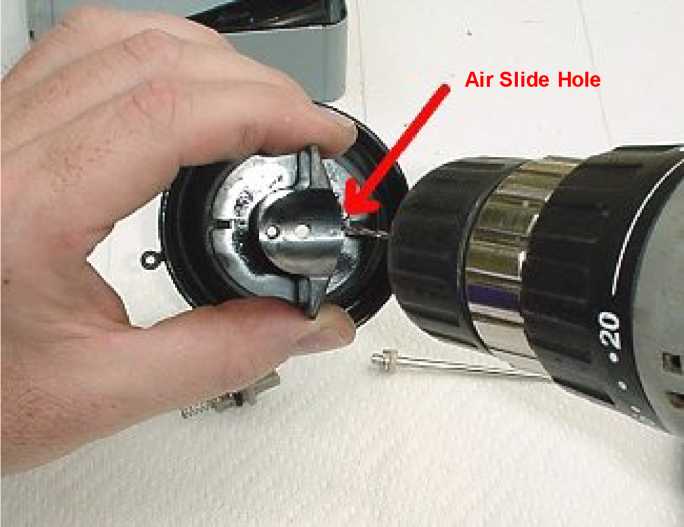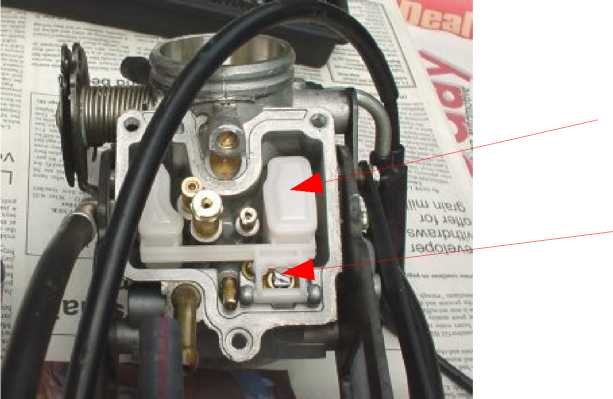
- •Raising the tank & removing the foam
- •Common Petrol abbreviations
- •Mikuni and Dynojet Main Jets
- •Main Jet Selection Methods
- •Top End Power Test (Full Throttle)
- •Mid Range Power Test (Full Throttle)
- •Mid Range Power Test (1/4 - 3/4 Throttle)
- •If, when doing the Full Throttle power test, you find that several clip settings give good results (may be hard to pick the best one), do the 1/4 - 3/4 throttle test to select the best clip setting.
- •Mid Range Power Test (1/8 to 1/4 Throttle)
- •Shimming the Jet Needle (fine tuning your Jet Needle clip setting)
- •Setting the Fuel Float Height
- •Float Level Adjustment
- •If the float tab is just touching the spring-loaded pin in the needle valve and not depressing the pin, you have the correct height.
- •Low End Power Test (Full Throttle)
- •Adjusting the Carburetor
- •With the airbox removed, slowly adjust the carb synch screw as in the picture below until the vacuum gauges read level.
- •Air Mixture Screw Adjustment Methods
- •T Throttle Position hrottle Operation
- •0Carburetor Jet Kits
- •2 X Mikuni #0984h5-60v2_2.9bt Jet Needles 2 X Needle e-Clips
- •X dsp77 Needle Springs 1 X dd #54 Slide Drill 1 X dd #5/32 Plug Drill
Mid Range Power Test (Full Throttle)
To test to see if you have the best Jet Needle clip position selected, do a couple of 3th gear full throttle runs from 4000 - 6000 rpm.
Too Rich - If the engine appears to pull harder in this range when you first do this test but not as hard after a further 15 minutes of hard use, then the Jet Needle is probably set too rich and needs to be lowered. Move the clip up one notch and retest until you find the best clip position that pulls the hardest on this test for this RPM range.
Too Lean - If the engine doesn't feel like it's pulling as hard as it should based on your stock test ride (it may stumble and feel like the engine is taking a while to wind up to 6000 rpm), then it's likely the Jet Needle has been set too lean. Move the clip down one notch and retest until you find the best clip position that pulls the hardest on this test for this RPM range.
Mid Range Power Test (1/4 - 3/4 Throttle)
If, when doing the Full Throttle power test, you find that several clip settings give good results (may be hard to pick the best one), do the 1/4 - 3/4 throttle test to select the best clip setting.
Too Rich - If acceleration is crisp but the engine hesitates or staggers as the throttle is quickly closed from 3/4 to 1/2 throttle, the mixture is too rich. Lower the Jet Needle one notch (i.e. make it leaner) and repeat the test. The needle will be correct when acceleration is crisp at mid-rpm yet the engine does not load up when you wind the throttle back down.
Too Lean - If acceleration seems soft or flat and the engine is slow to respond when the throttle is quickly opened from the 1/2 throttle position, the mixture is probably too lean. Raise the Jet Needle one notch (i.e. make it richer) and repeat the test.
Mid Range Power Test (1/8 to 1/4 Throttle)
To further refine the clip setting, this test will ensure you have selected the best clip setting using the above methods. Let your engine go cold before starting this test.
Too Rich - If your engine responds crisply at low throttle openings when you first do this test but doesn't feel as crisp after a further 15 minutes of hard use, chances are the Jet Needle is slightly rich. Lower the Jet Needle by moving the clip up one notch (i.e. make it leaner). A very rich needle clip setting will appear to give good results on the full throttle tests but stumble or bog down and almost stall when coming off-idle. The engine may also appear to be suffering from lean surging.
Too Lean - If your engine suffers from an abnormally slow warm-up or part throttle acceleration is flat and feels like it takes awhile to get going, your mixture may be too lean. Raise the Jet Needle by moving the clip down one notch (i.e. make it richer).
Shimming the Jet Needle (fine tuning your Jet Needle clip setting)
I f,
after setting the Jet Needle correctly, you still find that you have
a “flat” spot around the 4500 - 5000 RPM range when you try to
open the throttle in that range, you may need this mod. The term
“shimming” refers to adding a small washer under the Jet Needle
clip to raise (richen) the Jet Needle slightly. This washer (called a
shim) is equivalent to half a clip setting. Normally, it's just a
case of moving the stock washer from the top of the Jet Needle clip
to under the clip. The stock washer is a 3mm washer about 0.20 inches
(0.5 mm) thick. Some sites mention using two shims under the clip.
This is not necessary because two shims equal one notch setting
(notches are approximately 1.0 mm apart). See John Callahan's
http://www.geocities.com/catpoopman/howtoshim.html
notes
for a very good detailed explanation (with pictures) on how to shim
your Jet Needle.
f,
after setting the Jet Needle correctly, you still find that you have
a “flat” spot around the 4500 - 5000 RPM range when you try to
open the throttle in that range, you may need this mod. The term
“shimming” refers to adding a small washer under the Jet Needle
clip to raise (richen) the Jet Needle slightly. This washer (called a
shim) is equivalent to half a clip setting. Normally, it's just a
case of moving the stock washer from the top of the Jet Needle clip
to under the clip. The stock washer is a 3mm washer about 0.20 inches
(0.5 mm) thick. Some sites mention using two shims under the clip.
This is not necessary because two shims equal one notch setting
(notches are approximately 1.0 mm apart). See John Callahan's
http://www.geocities.com/catpoopman/howtoshim.html
notes
for a very good detailed explanation (with pictures) on how to shim
your Jet Needle.
Jet Needle
NOTE: If you still can't seem to get the best clip setting for the mid range power tests (even after doing the shim mod), then you may not h£ " ' " ' i ' a richer/leaner one.Drilling the Slide Holes
This is a mod that DynoJet recommends with their kits. Essentially, this does one thing - it increases throttle response by drilling the air slide holes using the #54 drill bit (0.55 inches or 1.4 mm) which is included in the DynoJet kits.

Having no experience with DynoJet kits, I cannot say how this mod performs using their stuff, however, I do have first hand experience with this mod using stock Suzuki & BMC Street air filters and I DO NOT RECOMMEND doing this mod on systems with standard air filters because it makes the abrupt on/off throttle response that plague V- Twins even worse. From my experience, this mod works best using an “open top” air filter due to the increased air those filters allow in.
Drilling the slide holes is easy and shouldn't take any more than a few minutes to do. For reference the stock air hole is 1.0 mm (I used various small sized drill bits to measure it) and I personally, used a 1.2 mm drill (same as 3/64 drill) and it seems to work well for me after I got an “open top” air filter.
See John Callahan's http://www.geocities.com/catpoopman/sv650 slidehole.html notes for a very good detailed explanation (with pictures) on how to drill your slide holes.
Drill
Bit Chart |
Inches |
Designation |
1.0000 |
0.0394 |
|
1.0160 |
0.0400 |
#60 |
1.0414 |
0.0410 |
#59 |
1.0668 |
0.0420 |
#58 |
1.0922 |
0.0430 |
#57 |
1.1000 |
0.0433 |
|
1.1811 |
0.0465 |
#56 |
1.1906 |
0.0469 |
3/64 |
1.2500 |
0.0492 |
|
1.3000 |
0.0512 |
|
1.3208 |
0.0520 |
#55 |
1.3970 |
0.0550 |
#54 |
1.4500 |
0.0571 |
|
1.5000 |
0.0591 |
|
1.5113 |
0.0595 |
#53 |
1.5875 |
0.0625 |
1/16 |
Fuel Float Height combined with the Pilot Jet controls your low end power. The general concensus is that the stock Mikuni 17.5 Pilot is the best one for our model so this part of the rejetting procedure will focus on getting the fuel float height correct. Fuel Float Height is critical to the proper operation of all carburetors and supposedly Mikuni adjusts the float height to the correct level during assembly, however, since the little float tab that control this crucial setting can be easily bent out of adjustment, it's something worth checking while you have the carbs open. A float level that is too high can make fine tuning of the idle circuit impossible whereas one that's set too low will have a similar effect on mid-range tuning.
Location
of the Float and Float Tab
Float
Float Tab
